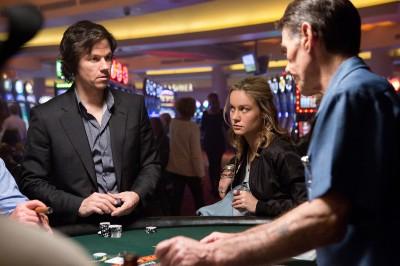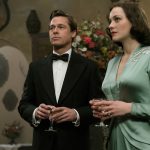Rupert Wyatt’s “The Gambler” is something of an anomaly.
He insists that it is not a remake of the 1974 Karel Reisz drama of the same name, though the two share similar plot points. Rather, the British director says “The Gambler,” his first film since 2011’s “Rise of the Planet of the Apes,” uses its 1974 counterpart to tell a different kind of story.

Reisz’s film focused on the nature of addiction and was heavily influenced by writer James Toback’s personal struggles. Wyatt’s film, on the other hand, has a protagonist who operates with controlled recklessness and is much more interested in gambling as a means of personal expression than the satiation of impulse. What viewers are left with is a rarity: a studio picture with an all-star cast — led by Mark Wahlberg — that is character driven, dialogue-heavy and utterly bereft of sensationalistic action sequences.
“What I wanted to get under the skin of, because I find them really interesting questions to be asking, is all of these choices that we make in our lives, all of these gambles that we take [and] all of these career and relationship choices that we have,” Wyatt said in an interview with The Daily Free Press. “All of those things, in a way, are gambles. That’s gambling to me, the real world.”
Even the film’s method of inception was untraditional. Wahlberg contacted Wyatt, urging him to read the script by William Monahan, who also penned “The Departed.” It was picked up briefly by Martin Scorsese with Leonardo DiCaprio in talks for the lead, but was eventually dropped and ended up in development hell for a number of years before being discovered by Wahlberg.
Wyatt was immediately enthralled by the script’s focus on dialogue and character and set out to assemble his dream cast. He succeeded and, thanks partially to the success of “Rise of the Planet of the Apes,” found himself making a studio-funded reimagining of a 1974 non-hit with his handpicked cast.
The film tells the story of a week in the life of Jim Bennett (Wahlberg), college professor and high-risk gambler. Jim is brilliant, charismatic and fiercely self-destructive, finding himself in a bind that costs him thousands of dollars and potentially multiple lives after the death of his wealthy grandfather. Jessica Lange plays his estranged mother, Brie Larson his student and love interest, Michael Williams a gangster to whom Jim is indebted and John Goodman gives brief but lasting turn as a witty criminal with a palpable, pragmatic moral compass. During the week, Jim attempts to distance himself from his privileged upbringing and engages a number of those around him in dangerous games of chance to pay off his personal debt.
Throughout “The Gambler,” music plays a prominent and crucial role in dividing up the film’s novelistic chapters as well as communicating the worldview of Wahlberg’s Jim. Early in the film, Jim addresses his literature students with a nearly seven-minute, high-energy lecture that paints him as cynical but concerned about artistic greatness. With Fiona Apple producers Jon Brion and Theo Green’s synth-heavy score aside, Wyatt chose a soundtrack that reflects Jim’s attitudes about genius, and sound like what Wyatt imagined the inside of Jim’s head might sound like.
“In that opening lecture, Jim sets out his whole agenda and his whole philosophy on life, which is that you’re either a genius or you’re nothing,” Wyatt said. “In the way that we shot it and the way that the soundtrack played out, it’s a great opportunity to cherry-pick the great musical artists of our time and previous decades.”
Artists like Dinah Washington, Pink Floyd, Pulp and Bob Dylan (covered by Billy Bragg) show up throughout the film’s action to echo the “great artists” motif.
Tonally, “The Gambler” is an interesting beast. It is ostensibly a crime drama and it operates effectively within that classification for a majority of its runtime. It is, after all, written by the man responsible for “The Departed,” one of the most critically and commercially successful crime dramas of the current age.
What this film does differently than many pure crime dramas, though, is inject nearly every scene with a level of black humor that often heightens the proceedings to just-shy-of-stylized territory. It is intentionally funny even as it aims to punch its audience square in the chest.
Wyatt said the films of Hal Ashby throughout the 1970s influenced his take on this unique mix of heavy dialogue-driven drama and heady comedy.
One of the most interesting aspects of “The Gambler,” which relates quite directly to its tone, is barely present in the theatrical print of the film. Twice the audience sees golden-hued flashbacks to Jim’s early life that correlate thematically to the present moments they interrupt. In Wyatt’s original cut, there were many more of these flashbacks that were fused together and integrated into the film as an entire subplot, which ran simultaneous to the main narrative.
This subplot dealt with Jim’s father, only alluded to in the current cut, and provided a level of context for Jim’s relationship with his mother and current mental state. While this subplot was not present in Monahan’s script, Wyatt added it in during shoots because he felt it was necessary to the development of Wahlberg’s character. Ultimately, though, the structure did not survive test sequences, and only two brief remnants remain.
“The fact that I added it in is possibly part of the reason that it didn’t work in the overall structure of the movie,” Wyatt said. “I felt the necessity to understand why Jim had become the kind of person that he was, to make sense of why he has such a disdain for his mother and why their relationship is so fragmented. It took the film, tonally, to quite a dark place, which I personally had no issue with because I thought it was provoking something quite interesting. But those two little moments that stuck around felt absolutely necessary within their parts of the film.”
With “The Gambler,” Wyatt has added a third feature film to a career that doesn’t seem to be following any predictable trajectory. His directorial debut, 2008’s “The Escapist,” was a British prison thriller with an almost metaphysical streak. “Rise of the Planet of the Apes” took an existing mythology and revitalized it by treating it without kid gloves and contemporizing its ethical scientific implications.
And now, with “The Gambler,” Wyatt has turned in a colorful, talky meditation on the gambles we take in our lives and the spiritual wealth we can gain by, as he puts it, “getting back to zero.”
“There’s a real logic to [what Jim does in the film] when you break it down,” Wyatt said. “He owes money to a lot of different people. He’s also trying to separate himself from his family permanently. He puts himself in a position where he can walk away from everybody, pay everybody off, not owe anybody anything, and, at the same time, walk away from his life and start over.”
While the methods may be unusual, the sentiment feels universal in the deepest, most basic sense.
“The Gambler,” starring Mark Wahlberg, Brie Larson, Jessica Lange, John Goodman and Michael Williams, will be in theaters Dec. 19.




